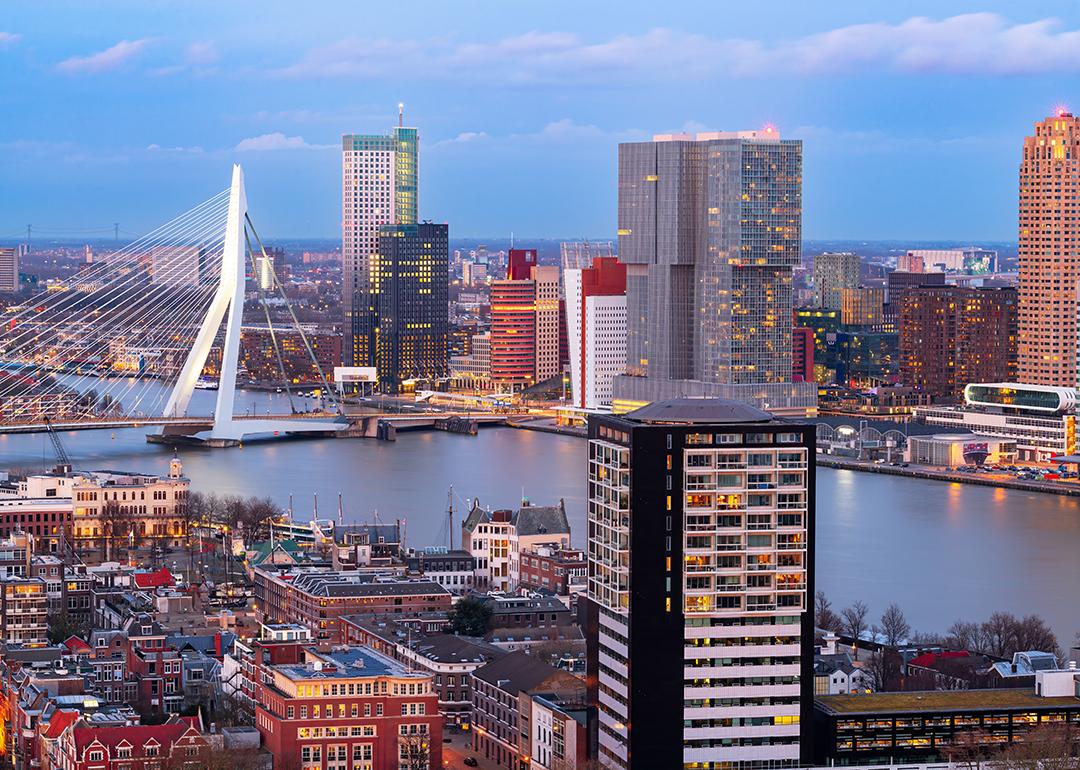
10 hidden cities where your career could take off in 2026
10 hidden cities where your career could take off in 2026
If you’re thinking about a big move in 2026, you don’t have to limit yourself to cities like London, Paris, or Berlin. Smaller and rising cities across Europe and the United States are quietly becoming hubs for professionals in technology, finance, creative industries, and innovation. In these places, you can grow your career while still enjoying life in neighborhoods that feel welcoming and full of character.
Life in many of these cities isn’t just about work. English is widely spoken in offices, communities are open to newcomers, and there is a culture that truly values balance. Weekends can be spent wandering historic streets, strolling along rivers, or sipping coffee at a sunny café. In these cities, work fuels your ambitions instead of taking over your life.
The practical side matters, too. Skilled workers can often access visas and relocation programs, housing is often affordable, and the cost of living is manageable. The International Rent Index from HousingAnywhere shows which cities let newcomers live comfortably without paying too much for rent.
Let’s take a closer look at the cities where career opportunity, affordability, and lifestyle come together, giving you a chance to build your future while enjoying every day.
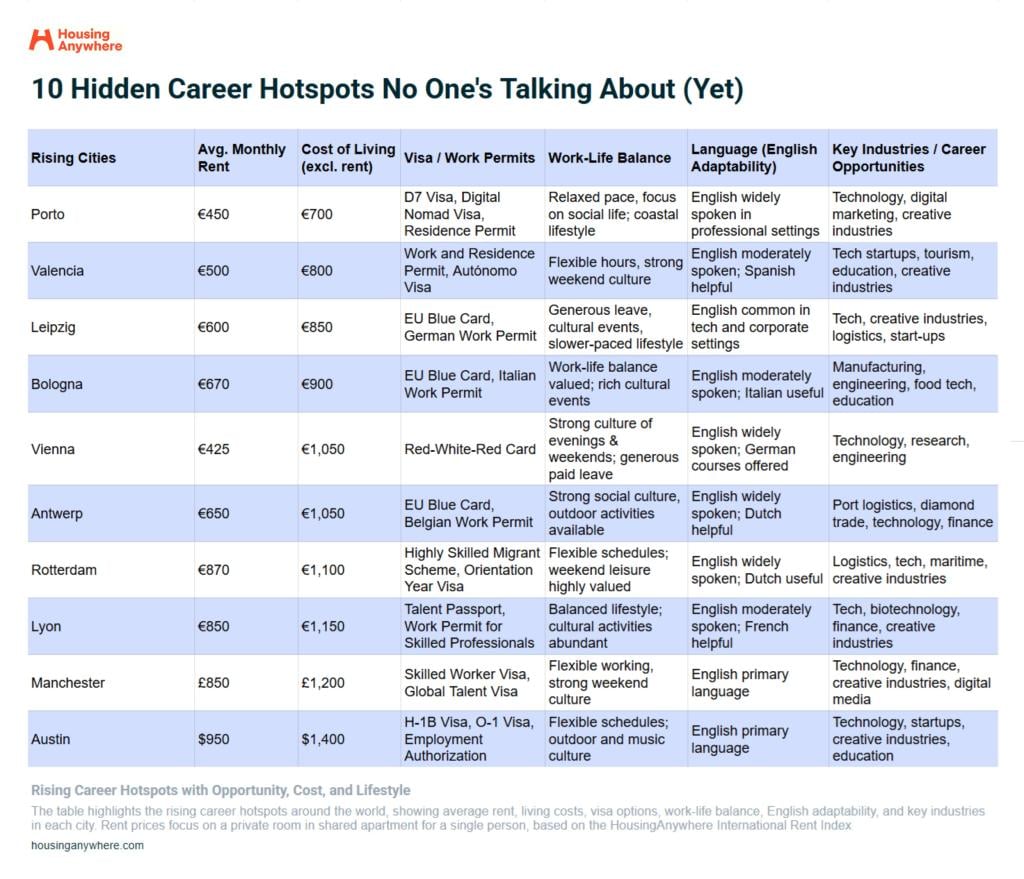

Porto
Porto, Portugal, has emerged as a rising hub for professionals in technology, digital marketing, design, and creative industries, attracting both European and international workers who want career growth without the high costs of Lisbon. Skilled workers can relocate through Portugal’s Work and Residence Permit, and entrepreneurs benefit from the Startup Visa, which supports innovative projects and small businesses.
English is widely spoken in tech, startups, and professional settings, while learning Portuguese helps immigrants integrate into local communities and navigate daily life more smoothly. Housing in central Porto averages around 450 euros (roughly $522 at current exchange rates) per month for a private room in a shared apartment, offering affordability and space that many find difficult in Lisbon. The overall cost of living that includes groceries, transportation, and dining is still moderate, making the city accessible for professionals at different career stages.
Work-life balance is embedded in Porto’s culture, with a slower-paced lifestyle that emphasizes social connections, outdoor activities along the Douro River, and weekends spent exploring nearby beaches and vineyards. The city blends historic charm, with its UNESCO-listed Ribeira district and traditional markets, with a growing modern professional ecosystem that includes coworking spaces, incubators, and vibrant tech communities. For expats, Porto offers the perfect combination of opportunity, affordability, and lifestyle, allowing newcomers to grow professionally while enjoying a rich and balanced urban life.
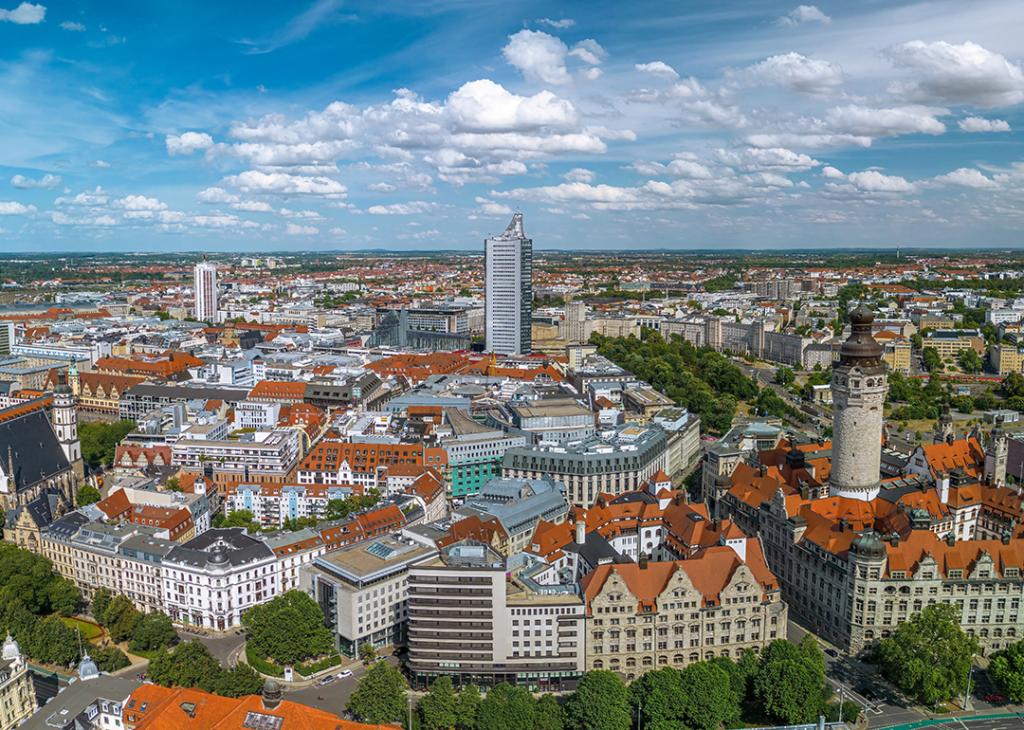
Leipzig
Leipzig, Germany, has quietly emerged as a dynamic city for professionals in technology, creative industries, logistics, and startups, attracting both domestic and international talent seeking opportunities beyond the high-cost hubs of Berlin or Munich.
Skilled workers can relocate through the EU Blue Card or the Job-Seeker Visa, while entrepreneurs benefit from local incubator programs and startup-friendly policies designed to nurture innovation. English is widely spoken in tech and international firms, though learning German helps in daily interactions and strengthens community connections.
Housing in central Leipzig averages around 500 euros per month for a private room in a shared apartment, offering significantly more space and affordability compared to Berlin, while the overall cost of living remains reasonable, with groceries, transport, and dining providing excellent value. Work-life balance is a strong part of local culture, with flexible working hours, generous vacation policies, and a focus on leisure, arts, and outdoor life.
The city combines historic charm and modern vibrancy, from the Baroque architecture and coffeehouses of the city center to a lively music scene, urban parks, and creative coworking spaces. For immigrants, Leipzig offers a rare combination of career opportunities, affordability, and a culturally rich environment, making it a compelling alternative to Germany’s more expensive urban centers.

Vienna
Vienna, Austria, has become a dynamic hub for technology, research, finance, and engineering, drawing expats who want professional growth without the extreme costs and competition of other European capitals. EU citizens can work freely, while non-EU professionals can apply for the Red-White-Red Card or other skilled worker visas, especially if they are in in-demand sectors. English is widely spoken in corporate and tech environments, and learning German helps with daily life, social connections, and networking.
Housing in central Vienna averages around 600 euros per month for a private room in a shared apartment, which is moderate for a Western European capital. Neighborhoods like Neubau, Leopoldstadt, and Mariahilf combine cultural charm, accessibility, and modern conveniences. The overall cost of living is manageable, with affordable public transport, groceries, and services that maintain quality. Work-life balance is a hallmark of Viennese life, with generous vacation policies, social benefits, and a strong emphasis on free time.
Residents can enjoy historic coffeehouses, opera houses, parks, and weekend escapes to nearby nature. Compared to smaller cities in Austria like Salzburg, Vienna offers more career opportunities and international exposure while remaining relatively affordable, making it an ideal place for newcomers to grow both professionally and personally.

Bologna
Bologna, Italy, is steadily emerging as a hub for engineering, design, food tech, and education, making it an attractive option for those seeking professional growth without the high costs and congestion of other popular cities in Italy. EU citizens can work without a visa, while non-EU professionals need a work visa, often sponsored by an employer, or a self-employment visa for entrepreneurial projects.
English is commonly used in international companies, universities, and research institutions, though learning Italian significantly enhances social integration, everyday life, and networking.
Housing in central Bologna averages around 670 euros per month for a shared flat, with neighborhoods like Centro Storico, Santo Stefano, and Bolognina offering a mix of historical charm, vibrant local life, and proximity to workplaces. The overall cost of living is moderate, with reasonably priced groceries, public transport, and dining. Work-life balance is ingrained in the culture, with long lunches, flexible hours, and a focus on leisure and family time.
Beyond work, Bologna provides a rich cultural life, from medieval towers and piazzas to the renowned culinary scene that draws both locals and visitors. Immigrants often find it easy to integrate thanks to coworking spaces, community hubs, and friendly neighborhoods. Bologna offers a unique combination of career opportunity, affordable living, and authentic Italian lifestyle, allowing newcomers to grow professionally while enjoying cultural and culinary richness.
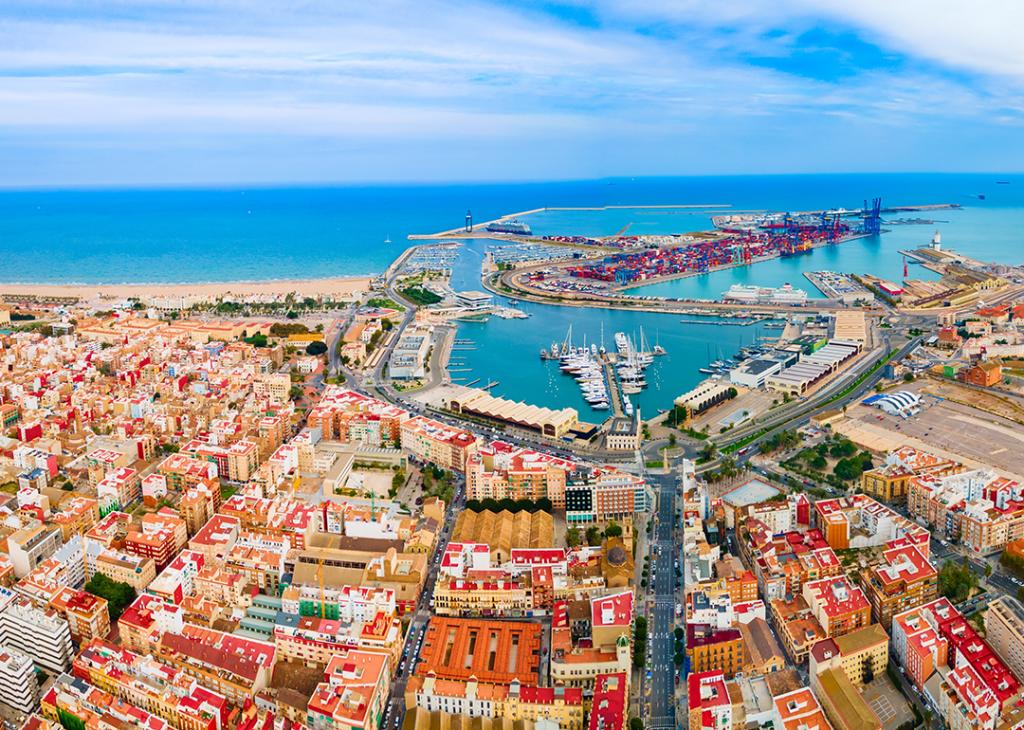
Valencia
Valencia, Spain, has quickly gained recognition as a destination for those working in technology, creative industries, tourism, and education. Unlike the more expensive and crowded hubs of Madrid or Barcelona, Valencia provides a balanced mix of career opportunities, lifestyle, and affordability. EU citizens do not need a visa to work, while non-EU professionals require a Work and Residence Permit. Entrepreneurs can take advantage of Spain’s Autónomo Visa for freelancers and small business owners.
English is commonly spoken in international companies and startups, while learning Spanish helps with daily interactions, social life, and deeper integration into local culture. Housing in central Valencia averages around 425 euros per month for a private room in a shared apartment, with neighborhoods like Ruzafa, El Carmen, and Cabanyal offering lively streets, historic architecture, and convenient access to workplaces. The overall cost of living is reasonable, with affordable public transport, groceries, dining, and leisure options.
Work-life balance is a defining feature, with long summer breaks, a vibrant festival calendar, and easy access to beaches or nearby mountains for weekend getaways. Valencia also has a growing immigrant community, coworking hubs, and professional networks that support newcomers. For those relocating, Valencia offers a harmonious blend of career growth, affordability, and ` Mediterranean lifestyle, where work and personal life can thrive together.

Rotterdam
Rotterdam, Netherlands, has become a rising hub for technology, logistics, and creative industries, attracting people who want career growth without the high housing costs and competition found in Amsterdam. EU citizens can work freely, while non-EU professionals typically require a work permit, often tied to employer sponsorship, or a self-employment visa if they plan to launch a startup. English is widely spoken in offices, and international firms often operate in English, but learning Dutch makes daily life, networking, and social integration easier in the Netherlands.
Housing in central Rotterdam averages around 700 euros per month for a furnished room in a shared apartment, according to a recent Kamernet rent report. The overall cost of living remains moderate, with affordable groceries, public transport, and dining options that make everyday life manageable. Work-life balance is a central part of Rotterdam’s culture, with flexible office hours, generous vacation policies, and a city that encourages outdoor leisure, from cycling along the Maas to visiting parks or nearby beaches.
Beyond work, the city is alive with cultural events, art exhibitions, music festivals, and a growing food scene that reflects its international population. Immigrants benefit from a supportive community, coworking hubs, and local organizations that ease relocation and integration. Rotterdam offers a unique combination of professional opportunities, affordability, and vibrant city life, providing newcomers with a chance to grow in their careers while enjoying a diverse and modern urban environment.
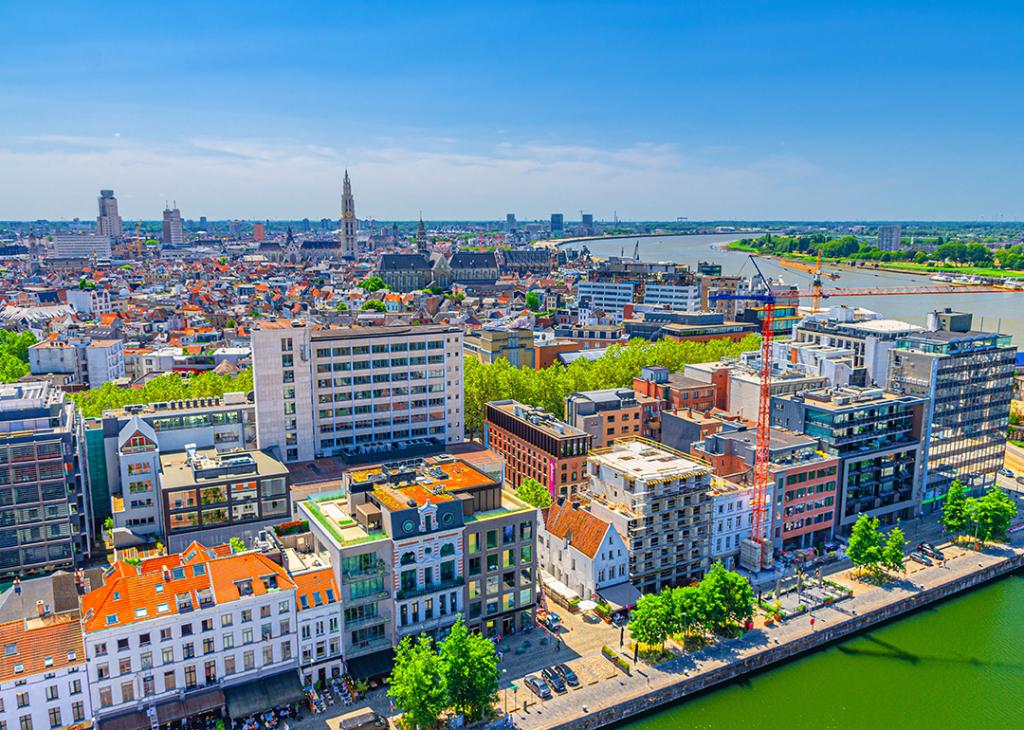
Antwerp
Antwerp, Belgium, is not only one of Europe’s largest ports and the world’s diamond trading hub, but it is also growing as a center for technology, logistics, and creative industries. With nearly 450 startups founded only in the past decade, the city’s entrepreneurial spirit is thriving.
Skilled professionals can relocate through Belgium’s professional card system or other work permits for highly qualified workers, and entrepreneurs have access to programs that support innovative startups. English is widely used in international companies, especially in logistics, trade, and tech sectors, though learning Dutch helps with daily interactions and building a local network.
Housing in central Antwerp averages around 650 euros per month for a private room in a shared apartment, which is more affordable and spacious compared to Brussels. The overall cost of living remains moderate, with groceries, dining, and transport providing good value.
Work-life balance is a priority in the city, with flexible hours, generous vacation time, and a lively cultural scene that includes historic architecture, museums, and riverside walks. Antwerp offers a unique blend of traditional industries and forward-thinking sectors, making it an attractive destination for professionals seeking both stability and innovation.
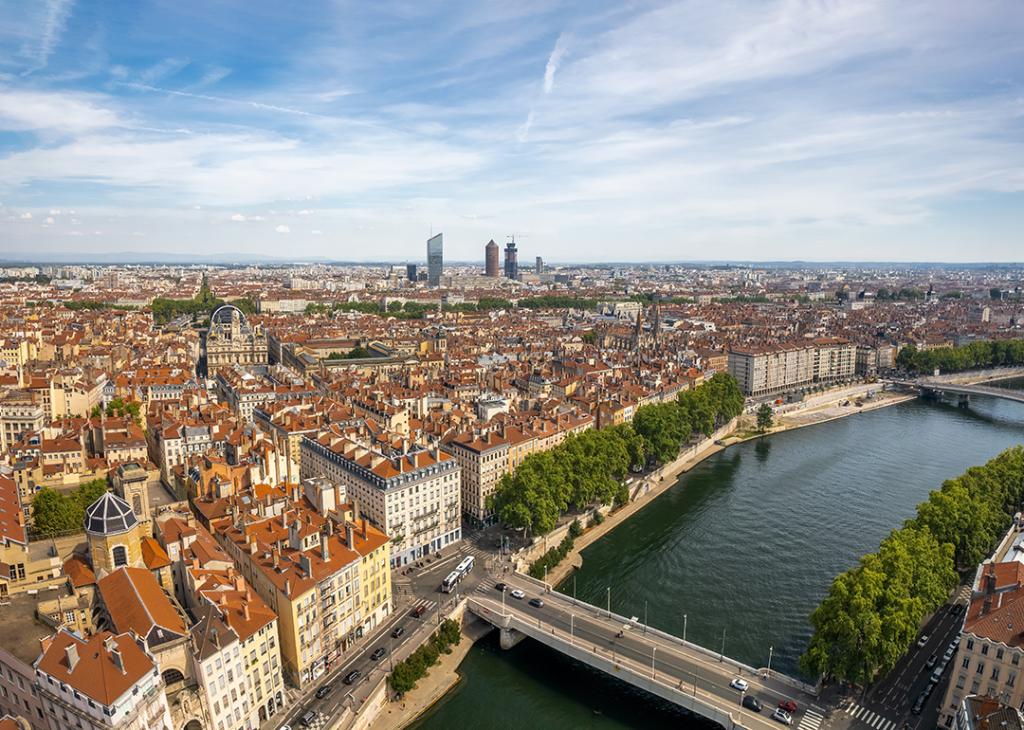
Lyon
Lyon has quietly become one of France’s rising hubs for finance, technology, and biotech, offering opportunities for expats who want a dynamic career without the high costs and housing pressures of Paris. Skilled professionals from the EU can work in Lyon with minimal bureaucracy, while non-EU migrants typically require a Talent Passport (Passeport Talent) or employer sponsorship to secure a work permit. Entrepreneurs and startup founders can access specific visas designed to support innovative businesses.
French is the primary language in daily life, but English is increasingly common in international firms and tech sectors, which helps newcomers integrate professionally, while gradually learning the language enhances social and community connections.
Housing in central Lyon averages around 850 euros per month for a private room in a shared apartment, with neighborhoods like Croix-Rousse, Confluence, and Vieux Lyon offering character, walkability, and access to both workplaces and cultural attractions. The overall cost of living remains more manageable than in Paris, with affordable public transport, groceries, and dining options. Work-life balance is highly valued, supported by shorter commutes, flexible hours, and a strong emphasis on leisure and cultural experiences. Lyon blends career growth with a rich lifestyle, from riverside walks and local markets to weekend escapes in the surrounding vineyards and Alps, providing a well-rounded experience that rivals France’s larger cities without the stress.
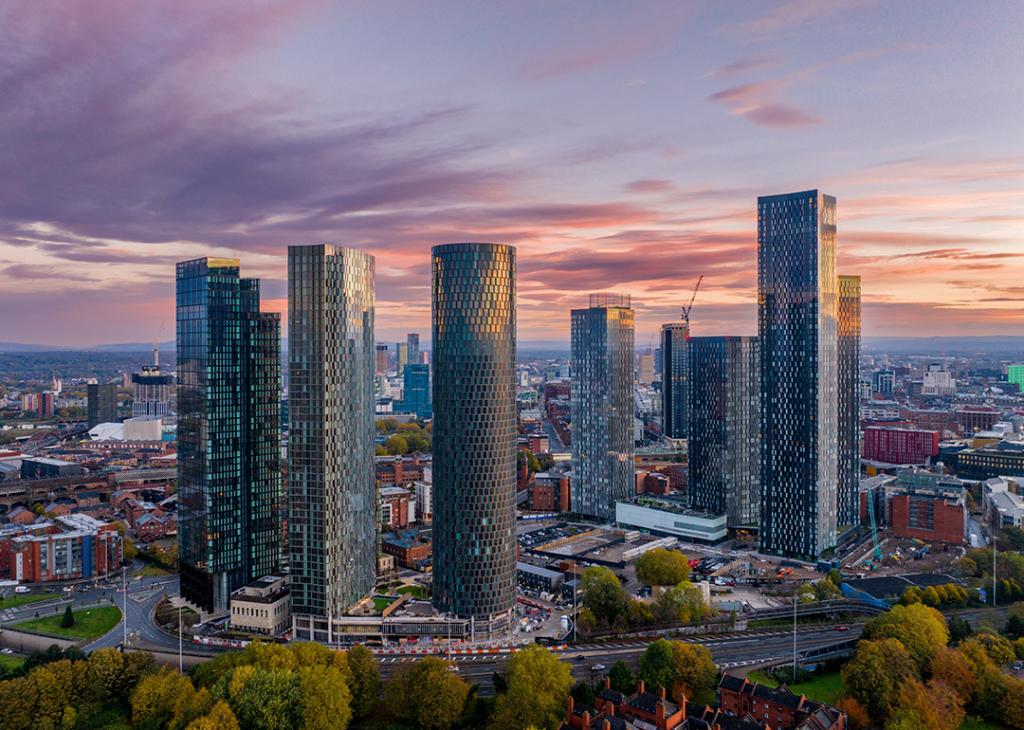
Manchester
Manchester has emerged as one of the U.K.’s most promising cities for technology, finance, and creative industries. Unlike London, which struggles with sky-high housing costs and intense competition for jobs, Manchester offers a growing job market with more accessible housing and a high quality of life.
Workers from abroad can relocate through the Skilled Worker Visa if they have a company willing to sponsor them, while entrepreneurs have access to programs supporting innovative startups. Non-EU migrants will need to follow a separate visa process, which often involves sponsorship by an employer or proof of investment for entrepreneurial ventures. English is the primary language, making professional and social integration straightforward, though understanding local business etiquette and networking helps build connections.
Housing in central Manchester averages around 850 pounds (roughly $1,137 at current exchange rates) per month for a private room in a shared flat, with neighborhoods such as Northern Quarter, Didsbury, and Salford offering both character and convenience. The overall cost of living is reasonable compared to London, with public transport, groceries, and services providing good value.
Work-life balance is increasingly emphasized, with flexible office hours and a culture that encourages social activities and weekend exploration. Manchester combines career growth, cultural vibrancy, and affordability, with historic streets, creative hubs, and nearby countryside making it a compelling alternative to London.
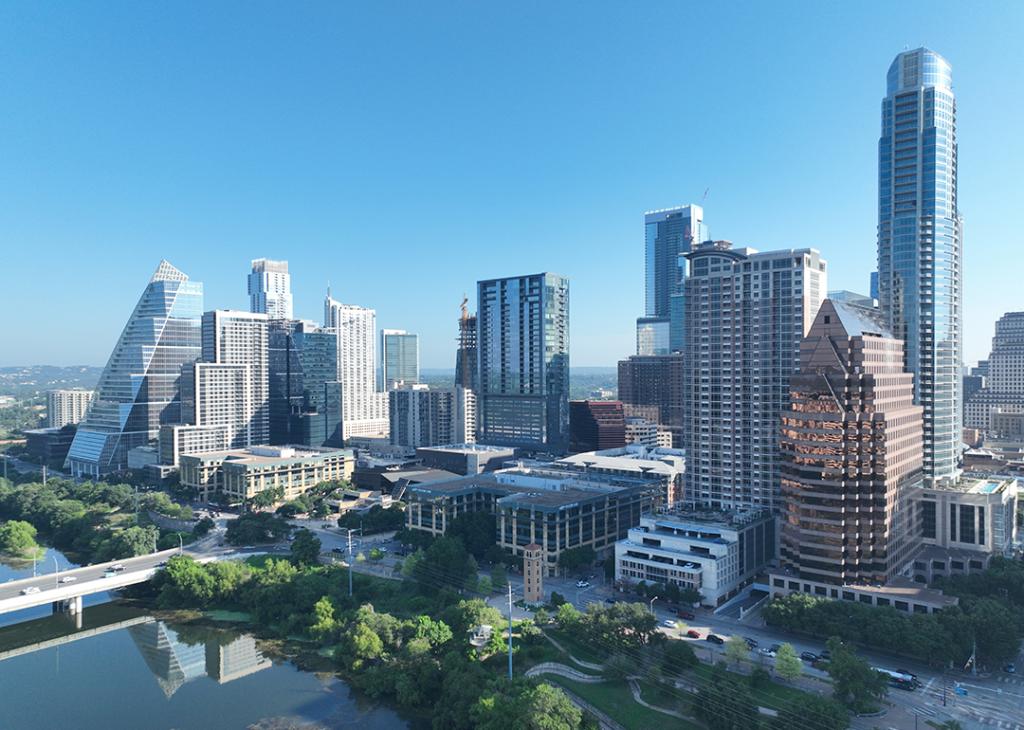
Austin
Austin, Texas, has grown into one of the United States’ most attractive cities for professionals in technology, startups, music, and creative industries, drawing people from across the world who are looking for career growth without the sky-high costs of New York or San Francisco. Skilled workers can obtain work visas such as the H-1B or O-1 for specialized talent, while entrepreneurs can take advantage of programs supporting tech innovation and business development.
English is the primary language, though local networks and community groups help newcomers build connections quickly. Housing in central Austin averages around $950 per month for a private room in a shared apartment, which is significantly more affordable than major coastal cities, while the overall cost of living, like groceries, transportation, and services, still remains comparatively manageable.
Work-life balance is an integral part of Austin’s culture, with an emphasis on flexible schedules, outdoor activities, live music, and food culture. The city combines a modern, entrepreneurial spirit with a relaxed, sunny lifestyle, from the tech corridors of downtown to the hiking trails of the Greenbelt and the lively neighborhoods of South Congress and East Austin. Austin offers a rare balance of career potential, quality of life, and a welcoming community, making it a compelling choice for those seeking opportunity in the United States without the pressures of traditional high-cost hubs.
These emerging career hotspots around the world are not just places to work; they are places to live well. Cities like Porto, Antwerp and Rotterdam show that ambition does not have to come at the cost of lifestyle. In these cities, work complements life instead of overshadowing it, and you can still enjoy simple pleasures such as a riverside walk, a café with friends, or a weekend escape without sacrificing your goals.
Moving abroad can feel intimidating, but these cities make it more approachable. Accessible visas, English-friendly workplaces, and a variety of housing options help newcomers settle in comfortably. Many immigrants rely on digital platforms to find temporary or midterm rentals, which can make exploring neighborhoods and adjusting to life in a new city much easier.
Ultimately, relocating is about more than a job. It is about embracing a life where career growth and personal happiness go hand in hand. These rising hotspots demonstrate that with careful choice, you can take that leap, discover new cultures, build meaningful connections, and live fully without compromise.
This story was produced by HousingAnywhere and reviewed and distributed by Stacker.



